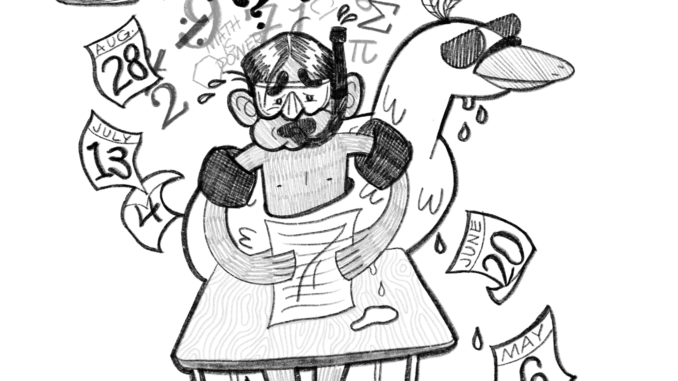
Schedules with periodic breaks, internship opportunities instead of summer vacation would benefit students
We have all had that disconcerting moment upon returning to school after a long break, where the professor writes some gibberish on the board, spouts some flapdoodle, then hands us our homework and gives us a genial slap on the back as we walk out the door. We step out and think, “what in the sweet high heavens just happened?”
Learning is often a “use-it-or-lose-it” situation: When we learn a concept or acquire a skill, we need to regularly apply it in order to keep it in our repertoire. The system that most colleges use in the United States, including Lewis & Clark, stacks the odds against a student’s ability to maintain knowledge.
We go to school for four months, being fed information with little pause, then are sent on our merry way for a month of winter break. During that month, many of us go home and vegetate, or go elsewhere and vegetate or stay on campus and vegetate. When we return to school, we scramble to recover half-forgotten concepts. After bathing ourselves in information for another four months, we hit summer break — three months of putting our learning on pause.
Proponents of summer break argue that it facilitates learning and life skills, as it gives students an opportunity to take on jobs and internships that they would otherwise be unable to partake in. While this is a valid point, it has to be balanced with the fact that during summers, we lose a lot of the knowledge that we gained over the school year.
Three months is more than enough time for our brains to prune away the “calculus” pathways and replace them with the “ice cream scooping” pathways. When we return to school at the end of August and go to our math classes, we look at the integral symbol and can only think of how inefficient it would be for scooping a cone of rocky road.
Besides the loss of information and skills, our schedule has another fundamental flaw: a dismal lack of breaks. In the four-month block that is the spring semester, we have one single week off and one national holiday, Martin Luther King Jr. Day, which falls on what otherwise would be the first day of school. Even compared to other schools which subscribe to traditional schedules, we have very few breaks.
Most schools, for example, had this past Monday off for Presidents’ Day. I am not claiming that we should have been celebrating Washington and Lincoln’s birthdays instead of going to classes, but I do think the ten weeks of school between winter and spring break warrant a moment to pause for the sake of both the students and the professors.
It is my opinion that our school and many others would benefit from a year-round schedule, or at least more frequent, shorter breaks. It is true that summer courses are offered at LC, but they are expensive, often not covered by scholarships, and as a result, are a nonviable or unattractive option to many.
The optimal schedule would integrate opportunities to do internships and research while also attending classes, rather than depend on summers for students to receive these experiences. This would require schools to rethink traditional education systems in favor of innovative offerings.
Our school has many resources already that would act as a solid baseline to implement this, such as a strong career center and a fair number of research opportunities. It would just be a matter of expanding these opportunities and restructuring the credit system. In making these changes, the academic success of students would doubtlessly be enhanced.
Subscribe to the Mossy Log Newsletter
Stay up to date with the goings-on at Lewis & Clark! Get the top stories or your favorite section delivered to your inbox whenever we release a new issue.

Leave a Reply